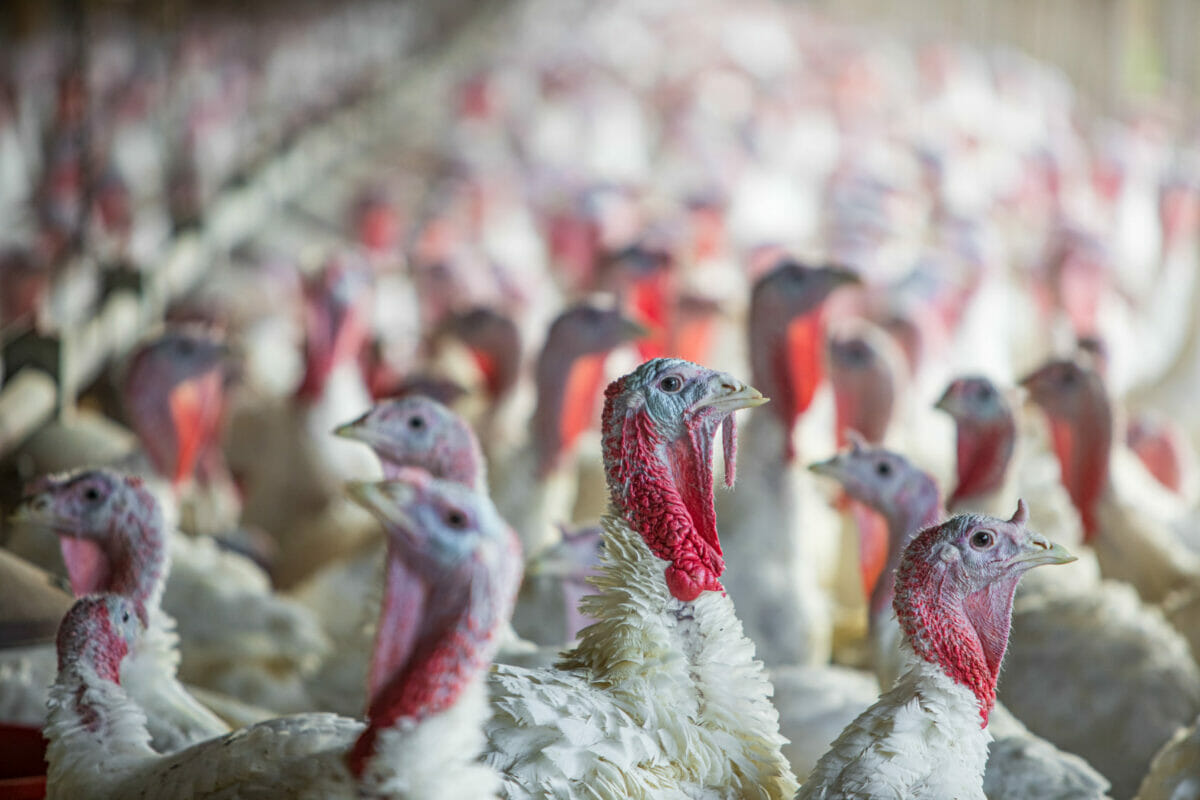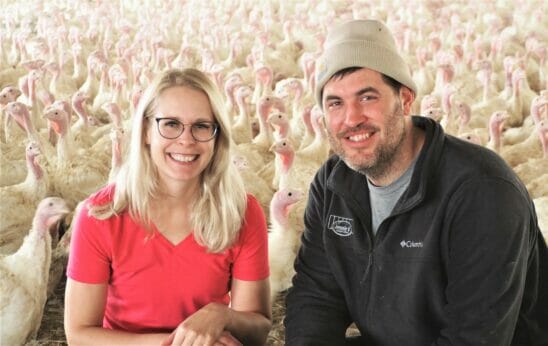The Great (Sticker Shock) Thanksgiving
This year, birds are smaller, more expensive and in short supply.
The Great (Sticker Shock) Thanksgiving
This year, birds are smaller, more expensive and in short supply.

Thanksgiving turkeys may be smaller than average this year.by Minnesota Turkey Growers Association
Americans won’t have trouble finding a Thanksgiving turkey, but they may wonder if this season’s hens were put on a diet, based on the supply of smaller-sized birds with inflated price tags.
However, experts say that avian influenza outbreaks and steep operational costs throughout the supply chain are to blame for the smaller-than-average birds.
Ashley Klaphake, a third-generation turkey farmer based in Melrose, MN, has certainly felt the pressures of inflation. Feed is roughly 20 percent more expensive compared to last year and anything that requires gas or propane, such as heating her barn, has shot up by 10 to 15 percent.
“It’s really been a challenging year for the sector,” she says. “Just when you think you’re caught up and have made it out of the last two years of…the pandemic, prices spike and the bird flu hits.”

Since March, more than 7.4 million commercial market turkeys have been euthanized due to avian flu outbreaks. This is a loss equivalent to roughly five percent of annual U.S. turkey production. Minnesota, the country’s top turkey-producing state, has had the most commercial poultry flocks affected by the virus. As of mid-November, the state has had 78 cases with more than 3.8 millions birds euthanized.
Avian influenza, a highly contagious virus, comes from wild waterfowl, such as ducks and geese. When domesticated poultry, such as chickens and turkeys, comes in direct or indirect contact with the feces of infected wild birds, they become infected and start to show symptoms, such as lethargy, coughing and sneezing and often sudden death. To stop the spread of this highly contagious virus, producers resort to culling.
Klaphake, who raises roughly 345,000 turkeys each year, has so far managed to shield her flocks from avian flu. But she fears for the day when that’s no longer the case. Recently, outbreaks in her region have been reported and she’s aware of neighbors who’ve been directly impacted.
Farmers with flocks that become infected must complete a carcass disposal, followed by thorough cleaning, disinfecting and a 28-day down time period where they are unable to start raising flocks. The state also has to complete three rounds of surveillance testing on birds before they’re cleared to enter commercial markets. The entire process can push producers back by 10-15 weeks, Klaphake says, but she’s heard of farms that have been behind by three months because it takes so long to get state approval.
Producers are also eligible for federal indemnity payments. These cover costs associated with animals that have to be destroyed because of avian influenza as well as culling, cleaning and disinfecting. The catch, however, is that financial assistance often doesn’t cover all of farmers’ expenses.
To play catch-up, Michael Stepien, a spokesperson for the U.S. Department of Agriculture, says farmers are increasing the production of lighter-weight birds they can raise in a shorter amount of time.
“In September, there was a 4-percent shift in traditional production patterns from heavier toms to lighter hens,” Stepien says. “By processing lighter birds that have a shorter grow-out cycle, the industry can increase the number of whole birds for the holiday season.”
Still, the USDA’s World Agricultural Supply and Demand Estimates report forecasts turkey meat production for the fourth quarter of 2022 at 1.290 billion pounds, a decline of 5.6 percent from 2021. The latest data from the Consumer Price Index shows that turkeys are roughly 17 percent more than expensive than they were in 2021.
David Ortega, a food economist and associate professor at Michigan State University, says the reason why farmers, such as Klaphake, are seeing their on-farm expenses soar has a lot to do with Russia’s invasion of Ukraine, which is exacerbating grain, fertilizer and energy prices.
“Cost of fertilizer and cost of grain has gone up and that goes into the cost of feed,” he says. “Naturally, this means birds will be more expensive to raise. Fuel diesel, needed to transport birds across the country, that’s spiked, too.”
Labor shortages throughout all segments of the food supply chain also play into higher turkey prices, says Ortega. There may also be increased demand this year, as more families are planning to gather together now.
Regardless, Klaphake says she hopes that Americans understand that it’s not farmers’ intent to leave anyone feeling squeezed when they reach the checkout line.
“It’s a lot of work to put food on the table and get turkeys to market,” she says. “Any business, any person, is affected by inflation right now. Farmers aren’t the exception… I think that’s why this holiday season is so important for us and our bottom line.”
Follow us
This work is licensed under a Creative Commons Attribution-NoDerivatives 4.0 International License.
Want to republish a Modern Farmer story?
We are happy for Modern Farmer stories to be shared, and encourage you to republish our articles for your audience. When doing so, we ask that you follow these guidelines:
Please credit us and our writers
For the author byline, please use “Author Name, Modern Farmer.” At the top of our stories, if on the web, please include this text and link: “This story was originally published by Modern Farmer.”
Please make sure to include a link back to either our home page or the article URL.
At the bottom of the story, please include the following text:
“Modern Farmer is a nonprofit initiative dedicated to raising awareness and catalyzing action at the intersection of food, agriculture, and society. Read more at <link>Modern Farmer</link>.”
Use our widget
We’d like to be able to track our stories, so we ask that if you republish our content, you do so using our widget (located on the left hand side of the article). The HTML code has a built-in tracker that tells us the data and domain where the story was published, as well as view counts.
Check the image requirements
It’s your responsibility to confirm you're licensed to republish images in our articles. Some images, such as those from commercial providers, don't allow their images to be republished without permission or payment. Copyright terms are generally listed in the image caption and attribution. You are welcome to omit our images or substitute with your own. Charts and interactive graphics follow the same rules.
Don’t change too much. Or, ask us first.
Articles must be republished in their entirety. It’s okay to change references to time (“today” to “yesterday”) or location (“Iowa City, IA” to “here”). But please keep everything else the same.
If you feel strongly that a more material edit needs to be made, get in touch with us at [email protected]. We’re happy to discuss it with the original author, but we must have prior approval for changes before publication.
Special cases
Extracts. You may run the first few lines or paragraphs of the article and then say: “Read the full article at Modern Farmer” with a link back to the original article.
Quotes. You may quote authors provided you include a link back to the article URL.
Translations. These require writer approval. To inquire about translation of a Modern Farmer article, contact us at [email protected]
Signed consent / copyright release forms. These are not required, provided you are following these guidelines.
Print. Articles can be republished in print under these same rules, with the exception that you do not need to include the links.
Tag us
When sharing the story on social media, please tag us using the following: - Twitter (@ModFarm) - Facebook (@ModernFarmerMedia) - Instagram (@modfarm)
Use our content respectfully
Modern Farmer is a nonprofit and as such we share our content for free and in good faith in order to reach new audiences. Respectfully,
No selling ads against our stories. It’s okay to put our stories on pages with ads.
Don’t republish our material wholesale, or automatically; you need to select stories to be republished individually.
You have no rights to sell, license, syndicate, or otherwise represent yourself as the authorized owner of our material to any third parties. This means that you cannot actively publish or submit our work for syndication to third party platforms or apps like Apple News or Google News. We understand that publishers cannot fully control when certain third parties automatically summarize or crawl content from publishers’ own sites.
Keep in touch
We want to hear from you if you love Modern Farmer content, have a collaboration idea, or anything else to share. As a nonprofit outlet, we work in service of our community and are always open to comments, feedback, and ideas. Contact us at [email protected].by Lindsay Campbell, Modern Farmer
November 22, 2022
Modern Farmer Weekly
Solutions Hub
Innovations, ideas and inspiration. Actionable solutions for a resilient food system.
ExploreExplore other topics
Share With Us
We want to hear from Modern Farmer readers who have thoughtful commentary, actionable solutions, or helpful ideas to share.
SubmitNecessary cookies are absolutely essential for the website to function properly. This category only includes cookies that ensures basic functionalities and security features of the website. These cookies do not store any personal information.
Any cookies that may not be particularly necessary for the website to function and are used specifically to collect user personal data via analytics, ads, other embedded contents are termed as non-necessary cookies.
Thanks for sharing this!